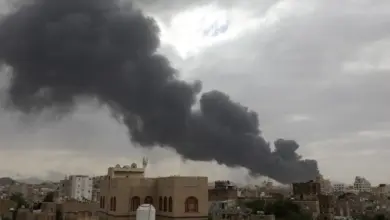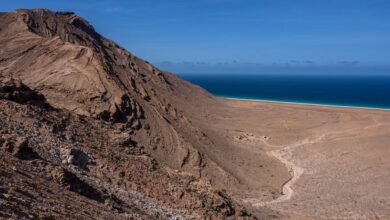SANAA – American drone strikes in southern Yemen have killed nine Al-Qaeda-linked militants, including the media chief for the group's Yemeni branch and the son of a prominent US-born cleric slain in a similar attack last month, government officials and tribal elders said Saturday.
In the capital, meanwhile, forces loyal to embattled President Ali Abdullah Saleh opened fire on protesters, killing at least nine and wounding scores, according to medical officials and witnesses. In a northern district of Sanaa, fighting between Saleh's forces and anti-regime tribesmen and renegade troops killed four supporters of a tribal leader and two civilians. At least 13 people also were wounded, including six civilians.
The airstrikes late Friday in the southeastern province of Shabwa pointed to Washington's growing use of drones to target Al-Qaeda militants in Yemen. The missile attacks appear to be part of a determined effort to stamp out the threat from the group, known as Al-Qaeda in the Arabian Peninsula, which US officials have said is the terror network's most active and most dangerous branch.
The Yemeni Defense Ministry identified the slain media chief as Egyptian-born Ibrahim al-Bana. Tribal elders in the area also said the dead included Abdel Rahman al-Awlaki, the 21-year-old son of Anwar al-Awlaki, a Muslim preacher and savvy Internet operator who became a powerful Al-Qaeda recruiting tool in the West. He, along with another propagandist, Pakistani-American Samir Khan, were killed in a 30 September US drone attack.
Yemen's Al-Qaeda branch has claimed responsibility for dispatching the would-be suicide bomber who failed to blow up a Detroit-bound flight in December 2009 with explosives sewn into his underwear.
The tribal elders, who spoke Saturday on condition of anonymity because they feared reprisals, said four other members of the Awlaki clan and another local militant were also killed in the same drone attack. There was no immediate confirmation of the younger Awlaki's death from Yemeni authorities.
Security officials said the drone strike was one of five carried out overnight by American drones on suspected Al-Qaeda positions in Shabwa and the neighboring province of Abyan in Yemen's largely lawless south. They said two more militants were killed and 12 wounded in other strikes in the two provinces.
The first strike late Friday targeted a house in the Azan district of Shabwa, but hit just after Al-Qaeda militants had a meeting in the building, security officials and tribal elders said.
They said a second strike then targeted two sport utility vehicles in which Bana and the six others were traveling, destroying the vehicles and leaving the men's bodies charred. It was not clear whether other participants in the meeting were targeted in separate strikes.
Yemen's Al-Qaeda offshoot has taken advantage of the political turmoil roiling the country. Saleh, who has ruled the country for more than 30 years, has been struggling to stay in power in the face of eight months of massive street protests demanding his ouster and the defection to the opposition of key aides and military commanders.
Militants linked to Al-Qaeda in the Arabian Peninsula have taken over several cities in the south, raising fears that they could establish a permanent stronghold in this strategically located nation. Yemen is located at the southern tip of the Arabian Peninsula, on the doorstep of Saudi Arabia and the oil-producing nations of the Gulf. It also overlooks strategic sea routes leading to the Suez Canal.
In a separate development, the security officials said suspected Al-Qaeda militants bombed a key underground gas pipeline that extends from the Balhaf area in Shabwa to an export terminal on the Arabian Sea. The Friday night attack started a massive fire, with columns of flames illuminating the night sky.
The security officials said non-Yemeni employees of the French company running the gas field and pipeline in Balhaf have been evacuated to Sanaa aboard three helicopters for their safety. They had no more details.
In Sanaa, forces loyal to Saleh opened up on protesters with assault rifles and anti-aircraft guns, medical officials and witnesses said. They said at least 180 people were wounded. The wounded were ferried to a hospital in ambulances and on motorbikes. Gunfire could be heard in the area of the clashes well into the afternoon.
The medical officials requested anonymity because they were not allowed to speak to journalists.
Elsewhere in the capital, anti-regime tribesmen and government forces traded mortar shells and rocket propelled grenades.
The fighting, which began overnight in the capital's northern Hassaba district, killed four tribesmen and two civilians.
As in the past, the fighting forced authorities to close the country's main international airport, which is nearby. Arriving flights were diverted to the southern port city of Aden, airport officials said, speaking on condition of anonymity because they were not authorized to release the information.



